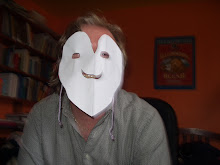"Intelligent Design" (ID) writers try to use Thomas Kuhn's theories to justify their approach, but they focus exclusively on the most rare of scientific happenings: the paradigm shift that occurs during revolutionary science. During a revolutionary period of science, two scientists operating from differing paradigms can literally look at the same evidence and see it differently -- both finding the evidence that supports their own paradigm. Ken Ham in his "Answers in Genesis" website uses the analogy of taking off the evolutionary sunglasses and putting on the ID sunglasses. You can literally look at the same evidence in two ways.
However, ID writers fail to include the other 99% of science. During normal science, there are research projects to pursue. Kuhn calls normal science "puzzle solving." The only reason why one paradigm can overtake another is that it offers better solutions to puzzles -- it offers research projects -- it gives scientists something to do.
ID does not give scientists anything to do. The basic idea in "Intelligent Design" is that things are so complicated that we just cannot understand how they work -- it must be the product of a superior intelligence! What does an ID scientist do? I guess he goes outside, notices how terribly complicated everything is, and says, "Gee, God must have done it! Well, now I'm done." There are no research projects. There are no puzzles to solve. There is nothing to do. That is the opposite of science.
Jane Austen and Male Self-Control
Jane Austen describes a world that is strangely parallel to modern conservative Islamic societies: if a young woman has sex prior to marriage or even marries the wrong man, she brings shame upon not just herself but the entire family -- and that will ruin their chances to make it in society.
There are obvious differences, of course, including the costumes. Austen's women wear beautiful dresses that flaunt their cleavage. Conservative Muslim women hide their entire bodies, sometimes leaving only a slit to peer through from their burqas. Austen's Christians put their faith in male self-control, even if those men have been drinking. Muslims assume that men have no self-control, and so they ban alcohol and hide the women.
We in the west have inherited this tradition. Thousands of generations of men in the west have been told that they can mold their own character, and that doing so is important to yourself and to others. By contrast, Muslim men have been taught that they cannot control themselves. Furthermore, that someone else is to blame for their errors.
There are obvious differences, of course, including the costumes. Austen's women wear beautiful dresses that flaunt their cleavage. Conservative Muslim women hide their entire bodies, sometimes leaving only a slit to peer through from their burqas. Austen's Christians put their faith in male self-control, even if those men have been drinking. Muslims assume that men have no self-control, and so they ban alcohol and hide the women.
We in the west have inherited this tradition. Thousands of generations of men in the west have been told that they can mold their own character, and that doing so is important to yourself and to others. By contrast, Muslim men have been taught that they cannot control themselves. Furthermore, that someone else is to blame for their errors.
Subscribe to:
Posts (Atom)
